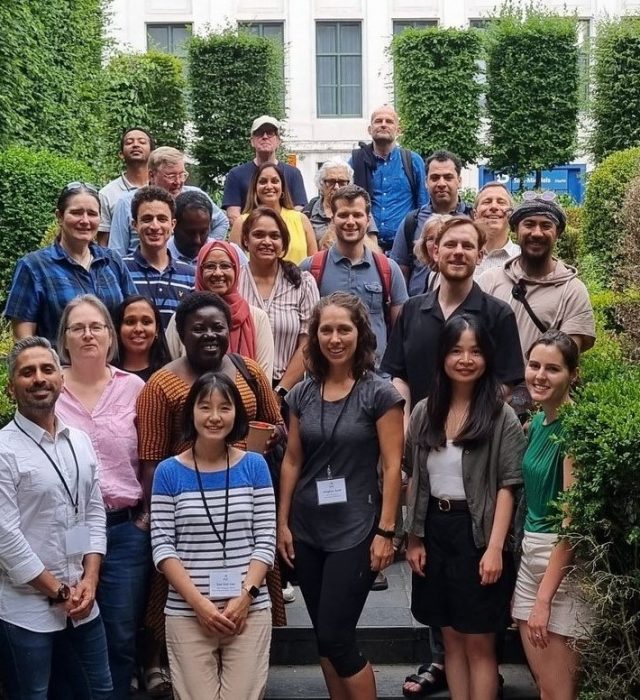
Dr. Meghan Azad Receives Prestigious 2024 Canada Gairdner Award
Award recognizes some of the world’s most significant biomedical, global health research discoveries
Dr. Meghan Azad is a renowned research leader and Professor with the Max Rady College of Medicine whose groundbreaking work is advancing the fields of infant nutrition, maternal-child health, and the developmental origins of disease.
The 2024 Canada Gairdner Momentum Award is an initiative of The Gairdner Foundation, recognizing some of the world’s most significant biomedical and global health research and discoveries. Laureates are mid-career investigators recognized for exceptional scientific research contributions with continued potential for impact on human health.
Azad is a Canada Research Chair in Early Nutrition and the Developmental Origins of Health and Disease and is a Research Scientist at Children’s Hospital Research Institute of Manitoba. She is recognized for her innovative research in human breast milk and infant microbiome as Director of the Manitoba Interdisciplinary Lactation Centre (MILC), the THRiVE Discovery Lab, and the International Milk Composition (IMiC) Consortium. Dr. Azad was recently featured on the Big Idea podcast.
“I am deeply honoured to receive this award to highlight the foundational impacts of breast milk in early childhood nutrition and the developmental origins of health and disease,” said Azad. “Although this award is presented to an individual, I would like to recognize the many colleagues, mentors and trainees I have the privilege of working alongside and thank them for their many contributions to this research.”

The Azad Research Team
Azad’s team of innovative researchers in breastfeeding, human breast milk and the microbiome are supported by the Canadian Institutes of Health Research, the US National Institutes of Health, and the Bill & Melinda Gates Foundation.
By studying thousands of children in Canada and internationally, her team has shown that longer and more exclusive breastfeeding is associated with reduced risk of asthma and healthier body composition. Her research has engaged organizations such as the World Health Organization, UNICEF and Health Canada to foster support for evidence-based policy-making.
Azad’s interest in breastfeeding began during her post-doctoral studies at the University of Alberta while training with the CHILD Cohort Study, working on a research project studying the infant gut microbiome to answer questions about the development of allergies and asthma. “The microbiome was a pretty new thing at the time and we found that one of the key variables in the study turned out to be whether babies were fed by formula or breast milk,” said Azad.
“Having found that breastfeeding was so important, I started my own lab at UM to better understand the butterfly effect of early nutrition, where the first few months have a lifelong impact on health and the immune system. We are also exploring how breastmilk works as a complex system. Previously, researchers focused on the nutrients, hormones, or cells in breastmilk would all be working independently. My approach has been to build multi-disciplinary teams to better understand how all these components interact and function together.”
Through MILC, Azad’s team works to connect scientists with healthcare providers and community members to co-design research projects about breastfeeding and lactation. More recently the international IMiC Study extends these community partnerships and research network in Burkina Faso and Tanzania and Pakistan.
“By working with diverse populations to develop strong evidence that breastfeeding is fundamentally important to infant health, we can help promote policies and programs to support breastfeeding – such as paid maternity leaves or lactation rooms in workplaces,” said Azad. “We also want to support parents who have trouble with breastfeeding. We are proud to collaborate with the Winnipeg Breastfeeding Center, Shared Health Manitoba, and the new Milk Mentors peer support program to enhance lactation support programs in our province. In the coming years we hope to see these resources expanded to improve access to rural and Indigenous communities.”
“This award is a tremendous achievement for Dr. Azad and the entire University,” said Mario Pinto, Vice President (Research and International). “We are honoured that she has selected the UM as her home and continue to celebrate her career milestones together. This award is a testament to the impact of her research, which is helping to improve maternal and child health outcomes in Canada and around the world.”
Research at the University of Manitoba is partially supported by funding from the Government of Canada Research Support Fund.







